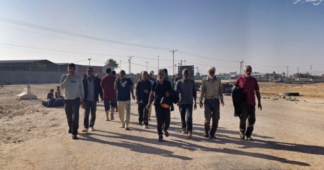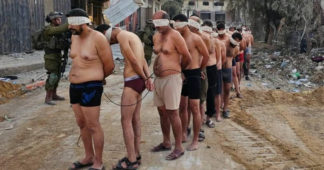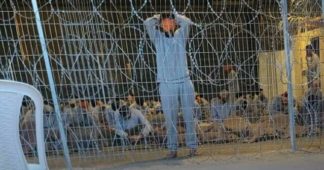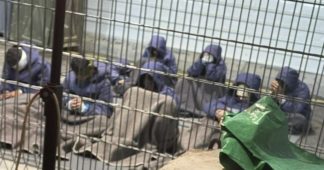Inmates at Israel’s shadowy new facility face non-stop abuse — from deadly beatings and electric shocks, to constant handcuffing and skin diseases.
By Oren Ziv
December 19, 2024
In February, Rami was arrested by the Israeli army at Gaza’s Al-Shifa Hospital. The 42-year-old Palestinian was taken to the notorious Sde Teiman detention center, where, like thousands of Gazans detained there, he endured severe abuse at the hands of the guards. But he was soon transferred out. “I thought I was being returned to Gaza, but I found myself in another prison,” he told +972 and Local Call. That prison was Ofer Camp — a military facility that Israel established during the current war to hold detainees from Gaza, located between Jerusalem and Ramallah in the occupied West Bank.
Rami described the facility as no less brutal than Sde Teiman. “I was severely tortured,” he said. “We were forced to kneel with our hands tied from sunrise until midnight. Guards beat us on every part of our bodies. I was given electric shocks every two days.” He stressed that such treatment was not exceptional: “All detainees at Ofer were tortured, beaten, and humiliated. We [all] received food only once a day.”
On March 24, after weeks of detention in these conditions, Rami was released back to Gaza; there were no charges filed against him.
+972 and Local Call obtained testimonies from 19 Palestinians, some of whom are current detainees who spoke through their lawyers at the Israeli human rights group HaMoked, and others who were previously held at Ofer Camp and released back to Gaza. They revealed conditions that are “similar, and in some cases identical” to those at Sde Teiman, as attorney Nadine Abu Arafeh from HaMoked explained.
Palestinians in Ofer report being handcuffed and, in some cases, shackled by their feet for 24 hours a day — even while sleeping, eating, and using the restroom — with the exception of a brief shower that is allowed, at most, once a week. They also describe facing regular beatings by guards — on one account, to death — along with ongoing humiliation, extreme overcrowding, and a lack of basic hygiene.
Gazans held at Ofer Camp, which is adjacent to the long-standing prison of the same name, are among the Palestinian detainees Israel classifies as “unlawful combatants.” As such, they go through a very brief legal procedure: normally, this consists of a three-minute hearing conducted via Zoom, where they are accused of “supporting terror,” and following which their detention is extended for another six months or until “the end of the war.”
According to HaMoked, 1,772 “unlawful combatants” are held in Israeli jails under the jurisdiction of the Israel Prison Service (IPS) as of December 2024. While the military has not disclosed the exact number detained at Ofer Camp, estimates suggest that hundreds are currently being held there.
Initially, lawyers for Palestinian detainees expected that Ofer Camp would serve as a temporary transit facility, holding detainees briefly before transferring them to Ofer Prison or other civilian prisons overseen by the IPS. And although the IPS recently boasted of toughening conditions for Palestinian detainees, lawyers had hoped that the increased scrutiny of civilian prisons might lead to somewhat more humane living conditions. However, despite claims by the Israeli military that detainees are “projected to be transferred to the IPS,” HaMoked continues to meet with detainees who have been held at Ofer Camp since May 2024.
‘One of the young men detained with us was killed’
In May, following mounting revelations of severe abuse against detainees at Sde Teiman — including cases of death and even rape — a group of five Israeli human rights organizations filed a petition with the High Court of Justice, arguing that the conditions in the facility violated existing Israeli law. Ultimately, the court sided with the petitioners and ruled in September that “detention of individuals in the Sde Teiman facility, or any detention facility, must comply with the requirements of the law.”
Although the court stopped short of ordering the closure of Sde Teiman, the facility was gradually converted into a transit camp. In recent months, Palestinian detainees have simply been screened at Sde Teiman before being sent back to Gaza or moved to Ofer Camp. But the abuse hasn’t stopped: it has merely been relocated.
“The testimonies of detainees who were held or are still being held in Ofer Camp indicate that the state is disregarding the recent High Court ruling regarding detention conditions at the Sde Teiman facility,” Abu Arafeh of HaMoked explained.
According to one Palestinian who was held at Sde Teiman and later transferred to Ofer, the main difference between the two facilities is that at Ofer, detainees are allowed to stand in their cells, whereas at Sde Teiman they were forced to kneel all day long. Another detainee who spoke to a HaMoked said that the main “improvement” at Ofer compared to Sde Teiman is that “there’s a Quran in the cell, and we’re allowed to pray.”
One crucial difference, however, is that while Sde Teiman received some international scrutiny, very little is known about what is occurring at Ofer, and it has received almost no coverage in the international media.
Rafiq, a 59-year-old from northern Gaza, was arrested in November 2023. After spending a week at Sde Teiman, he was transferred to Ofer. “We all suffered the same level of torture, humiliation, and insults,” he told +972 and Local Call. “They treated us as if we would never see our families in Gaza again. I thought I would leave prison dead.
“One of the young men detained with us was killed during his release: [the soldiers] struck him on the head, and he died immediately,” he continued. “I lost 43kg during my detention due to the lack of food. The only comfort I had was thinking about my family, which helped me dissociate from the reality of imprisonment.”
After spending about a month inside Ofer, Rafiq was released back to Gaza, but has continued to suffer from his experiences there. “My hands are paralyzed because of the torture, and I am taking heavy psychiatric medications. I walk dozens of kilometers every day to exhaust myself so I can sleep. I lost my life because of that detention.”
Handcuffed day and night — even in the bathroom
Based on testimonies provided to HaMoked, Abu Arafeh explained, detainees at Ofer Camp endure “harsh conditions far removed from the minimum standards required to meet their basic needs. This indicates violations of their rights as detainees and as human beings, creating the impression that, in many cases, these conditions amount to torture.”
All but two detainees who were recently held at Ofer described being kept in handcuffs while inside their cells. A 28-year-old inmate said detainees’ hands are unshackled only “for half an hour a week, for a shower,” and another reported that being in handcuffs 24 hours a day caused his hands to feel “numb.”
A 48-year-old father of three, who was arrested in March 2024 at his home in Gaza City, said he was told by Israeli soldiers: “We know you have no connection to October 7, but we know you have information about Hamas and its operatives.” He was transferred to Ofer Camp, where he remained handcuffed “all day and night.”
According to the testimonies, humiliation and violence are part of daily life in Ofer, with guards beating detainees for their own amusement. A 23-year-old prisoner testified that, compared to Sde Teiman, “in the room, we are permitted to stand,” but “every time I move from one section to another, they beat me.”
“Every time the guards walk through the corridor, the detainees have to lie face down on the floor, and anyone who does not comply is punished and beaten on the hands,” a 32-year-old detainee said. “The officers curse at us all day.”
Many detainees spoke about poor and inadequate food, with identical daily meals primarily consisting of four slices of white bread with a teaspoon of jam, cheese, or chocolate spread, with no source of protein. “Sometimes there’s labneh or cheese, occasionally a small amount of tuna,” one prisoner testified. “Other than that, there’s nothing — no eggs, meat, or chicken.”
“The food arrives in terrible condition,” one detainee currently held at Ofer said. “In the morning, we get three slices of bread, one of them with a bit of jam. Previously, we got five slices, but recently the amount has been reduced. In addition to the bread, each person gets one tomato.”
A 32-year-old Gazan detainee who was arrested at Al-Shifa Hospital testified that “all prisoners have lost 20-30kg.” Detainees also reported that prison cells are extremely overcrowded, with many suffering from skin diseases due to the poor hygiene conditions.
A 28-year-old father of two, who was arrested in March 2024, also at Al-Shifa, said that 16 people were held in a cell designed for 12. “The others don’t have mattresses, so we take turns,” he explained. Those without a bed are forced to sleep on two-centimeter thick mattresses placed on the cell floor.
“Once a week, we’re allowed to change underwear and shower with cold water,” he added. “Clothes are not changed. Every one to two weeks, we’re given a single roll of toilet paper for all the detainees. Soap is only provided during the shower.”
There is no laundry service in Ofer, so detainees are forced to wash their single allotted piece of clothing — a gray tracksuit that some have been wearing for four months — in the cell’s sink or toilet. Showers are allowed once every one to three weeks, according to some testimonies, during which prisoners may receive a new pair of underwear.
“When there were cases of scabies in the cell, we were allowed to shower once a week,” recounted one prisoner who has been in Ofer Camp since April. “But after they recovered, we returned to the awful routine. There are no toothbrushes, and soap in the cell is only available sometimes.”
A prisoner from Gaza City testified that he was left handcuffed when going to the bathroom and wasn’t allowed to clean himself. For showers, he said, they are given “less than three minutes,” adding that he had to bathe using “floor-cleaning detergent.”
‘I dream of seeing sunlight’
Disturbingly, some of the detainees only discovered that they were being held in Ofer Camp during meetings with lawyers from HaMoked — weeks or even months after arriving at the facility.
A 66-year-old father of four, who was arrested at his home in Rafah in May 2024, was taken to Sde Teiman and later to Ofer. “Only [since late October] do I know I’m in Ofer,” he told his lawyer. “I had a hearing via Zoom. They told me I’m detained until the end of the war, accused of being affiliated with a terrorist organization. I’m a schoolteacher, not connected to Hamas or any hostile activities against Israel.”
For detainees, meeting with a lawyer may be the only opportunity they have to leave their cells. “There are no papers or pens, so we can’t file complaints,” noted one detainee, who was arrested in Khan Younis in February. “We try to make requests through the shawish [a Hebrew-speaking prisoner assigned to liaise with the guards], but the situation doesn’t improve. I dream of seeing sunlight, even just once.”
But lawyers’ visits have also come at a steep cost for other detainees. One 26-year-old testified that when a lawyer meets with one prisoner, all the others in the cell are taken out and shackled, blindfolded, and forced to lie down for the duration of the visit. “I pray that [the lawyers] don’t come to visit us,” he said. “This is the nightmare of all the detainees.”
In its response to queries for this article, an Israeli army spokesperson claimed that “detainees held at the Ofer Military Detention Facility are those who have been found to be involved in terrorist activity and have undergone a judicial review conducted before a District Court judge.” The spokesperson rejected “claims of systematic abuse of detainees, including through violence or torture” at Ofer, noting that abuse is “against the law and IDF orders” and that the facility is “regularly filmed and is under the supervision of commanders.”
The spokesperson also claimed, contrary to the testimonies, that detainees at Ofer receive blankets, a mattress, hygiene products, clothing, three meals a day, and “appropriate medical care.” While “most detainees are not held in handcuffs,” the spokesperson added, in certain cases “an individual decision is made to handcuff a detainee, in a way that does not prevent him from eating, showering, or using the bathroom.”
We remind our readers that publication of articles on our site does not mean that we agree with what is written. Our policy is to publish anything which we consider of interest, so as to assist our readers in forming their opinions. Sometimes we even publish articles with which we totally disagree, since we believe it is important for our readers to be informed on as wide a spectrum of views as possible.











